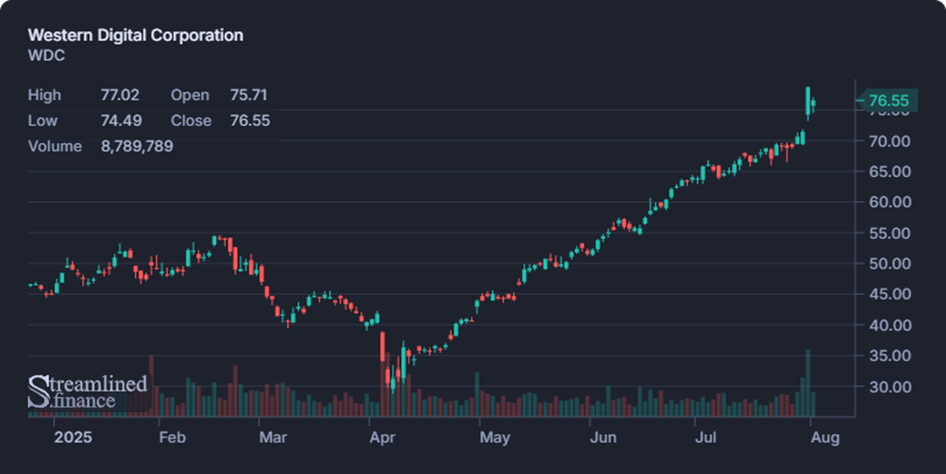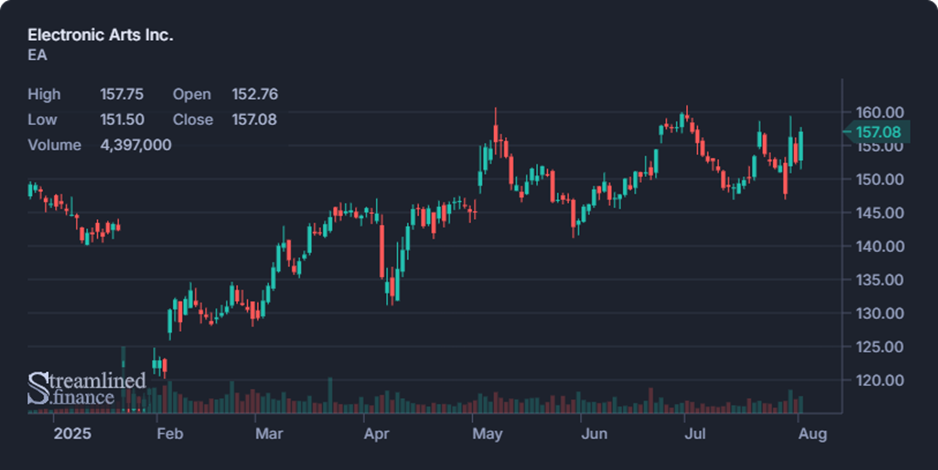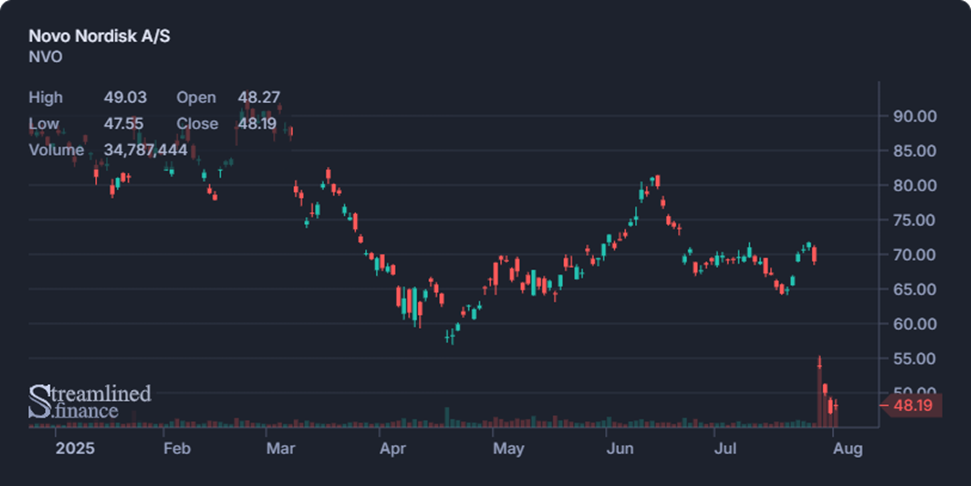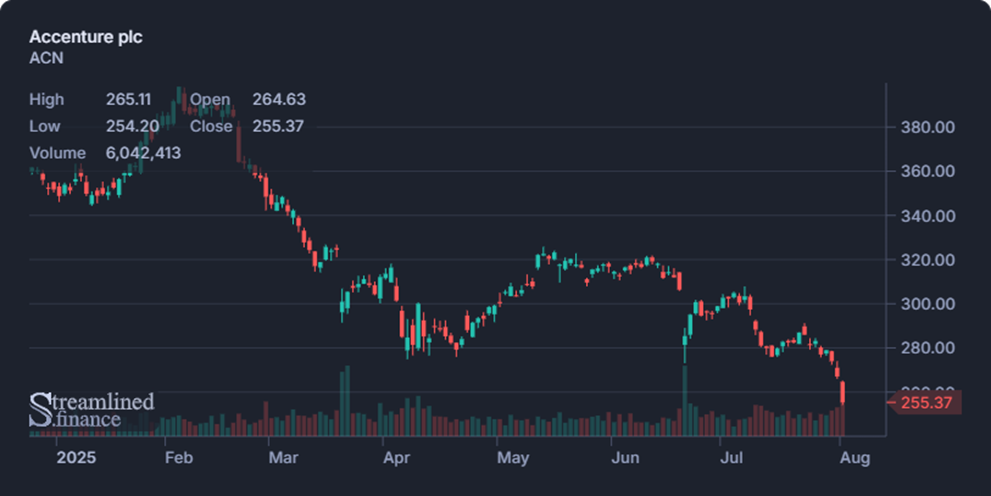The markets took a sharp turn last week as the S&P 500 declined by 2.36%, snapping its recent bullish streak. With the index hovering near overbought territory and an RSI reading of 75, volatility crept back in, marking the first signs of a potential correction. While the recent surge in stocks reflected continued investor optimism despite uncertainty, data suggests the economy may be on shakier ground than headline numbers indicate. Rising company defaults, weaker consumer borrowing, a slowing housing market, and softer job trends all signal that investors should be more cautious in the coming weeks.
On the global stage, tensions flared between the United States and Russia. President Trump announced that he was shortening his deadline for a Russia-Ukraine peace deal from 50 days to under two weeks. If unmet, he warned that significant tariffs would be imposed on nations continuing trade with Moscow. In a fiery social media post, former Russian President Dmitry Medvedev warned that each new ultimatum from President Trump regarding Russia’s involvement in Ukraine is not just a threat to Ukraine but a step toward war with the United States itself. In response, Trump revealed he had ordered two nuclear submarines to be positioned in key regions, signalling increased military readiness.
India, too, came under fire. After imposing a 25% tariff on Indian goods, Trump criticized India’s trade practices and its relationship with Russia. He argued that the United States has done little business with India and mentioned, “They can take their dead economies down together, for all I care.”
Switzerland also faced a heavy blow. The Trump administration imposed a 39% tariff on Swiss exports. The Swiss government is now working with U.S. officials to resolve the issue, though manufacturers have warned that tens of thousands of jobs are at risk. The United States remains Switzerland’s top export destination for products like watches, chocolates, and precision tools.
Back home, Trump fired Erika McEntarfer, head of the Bureau of Labor Statistics, after monthly jobs data showed a slowdown in hiring. Trump alleged the numbers were politically manipulated but provided no evidence.
In a separate effort to control drug prices, Trump sent letters to 17 of the world’s largest pharmaceutical companies, including Eli Lilly and Pfizer. He demanded they cut Medicaid prices to match what consumers pay overseas. He gave them 60 days to comply, warning that the government would use every tool available to crack down on what he called abusive pricing practices.
Amid these political developments, Big Tech reported strong earnings. Microsoft, Apple, Meta, and Amazon all beat expectations, offering a bright spot for the market. However, given the rising uncertainties on both macro and geopolitical fronts, investors would do well to stay alert for how these risks could impact future results and valuations.
Weekly Earnings Roundup: Surprises & Misses
Several major companies released their earnings last week, including Visa (NYSE: V), Procter & Gamble (NYSE: PG), Booking Holdings (NASDAQ: BKNG), AstraZeneca (NASDAQ: AZN), Microsoft (NASDAQ: MSFT), Meta Platforms (NASDAQ: META), Apple (NASDAQ: AAPL), Amazon (NASDAQ: AMZN), Mastercard (NYSE: MA), S&P Global (NYSE: SPGI), and Colgate-Palmolive (NYSE: CL). Below is a quick look at some of the most notable names.
Microsoft revenue was up 18% YoY and EPS was up 24% driven by cloud growth. Shares rose 4% the day after the call, pushing the market cap past $4T, joining the exclusive club with $NVDA. However, the price went down by 1.76% on Friday, impacted by the overall negative sentiment of the market.
Meta's revenue was up 22% YoY and EPS up 38% led by their ad business. Mark Zuckerberg is doubling down on AI efforts as Meta raised its 2025 expected capex floor from $64B to $66B to scale infrastructure and meet AI-related compensation. Share price rose by 5% in the week.
Amazon revenue was up 13% YoY and EPS up 33%. Shares declined 8% in the week as the midpoint of Q3 operating income guidance ($15.5B - $20.5B) missed the $19.5B consensus.
Apple posted a June quarter revenue record, with revenue up 10% YoY and EPS up 12% YoY. Growth was driven by strong iPhone (up 13% YoY) and Mac (up 15% YoY) sales, as consumers purchased ahead of expected tariff-driven price hikes. Despite beating expectations, the share price declined by 5% in the week.
Top Gainers
Hard disk manufacturer Western Digital (NASDAQ: WDC) shares gained by 10% in the week, driven by a target price upgrade from various market analysts. The company’s recent Q4’25 results beat expectations, with revenue surging 30% YoY. The company also announced a new quarterly dividend and a $2 billion share repurchase program. Investors are also bullish on rising demand for high-capacity storage, particularly in the cloud segment.

Shares of Game publisher Electronic Arts (NASDAQ: EA)surged by 3% after the company beat earnings expectations, reporting net revenue of $1.671 billion and net bookings of $1.298 billion. The positive move was also supported by BoFA Securities, which raised its price target on the stock to $168 from $166.

Top Losers
Shares of Danish drug-maker Novo Nordisk (NYSE: NVO) declined by 32% in the week after the company lowered its revenue and operating income guidance. The company is facing additional headwinds that include a recent CEO change and Trump’s letter to lower drug prices that sent shockwaves across the entire sector. Pfizer and Eli Lilly also declined by about 5% in the week.

Accenture (NYSE: ACN) share price declined by 9% in the week, with multiple factors impacting the consulting firm. HSBC initiated coverage on Accenture with a "Reduce" rating and a $240 price target on July 28, 2025, citing potential disruption from AI in the IT services sector. Additionally, the broader market dip on Friday seems to have had an impact, with shares declining by 4%.

Upcoming Earnings: Key Stocks to Monitor
The upcoming week is filled with earnings from major names including Palantir (NASDAQ: PLTR), Disney (NYSE: DIS), Novo Nordisk (NYSE: NVO), Uber (NYSE: Uber), Airbnb (NASDAQ: ABNB), AMD (NASDAQ: AMD), Shopify (NASDAQ: SHOP), and Pfizer (NYSE: PFE).
With volatility creeping back into the market, investors should remain cautious, review their portfolios, identify high-risk positions, and make necessary adjustments. Special attention should be paid to management commentary, as it may offer crucial insights into how companies are navigating an increasingly uncertain environment.